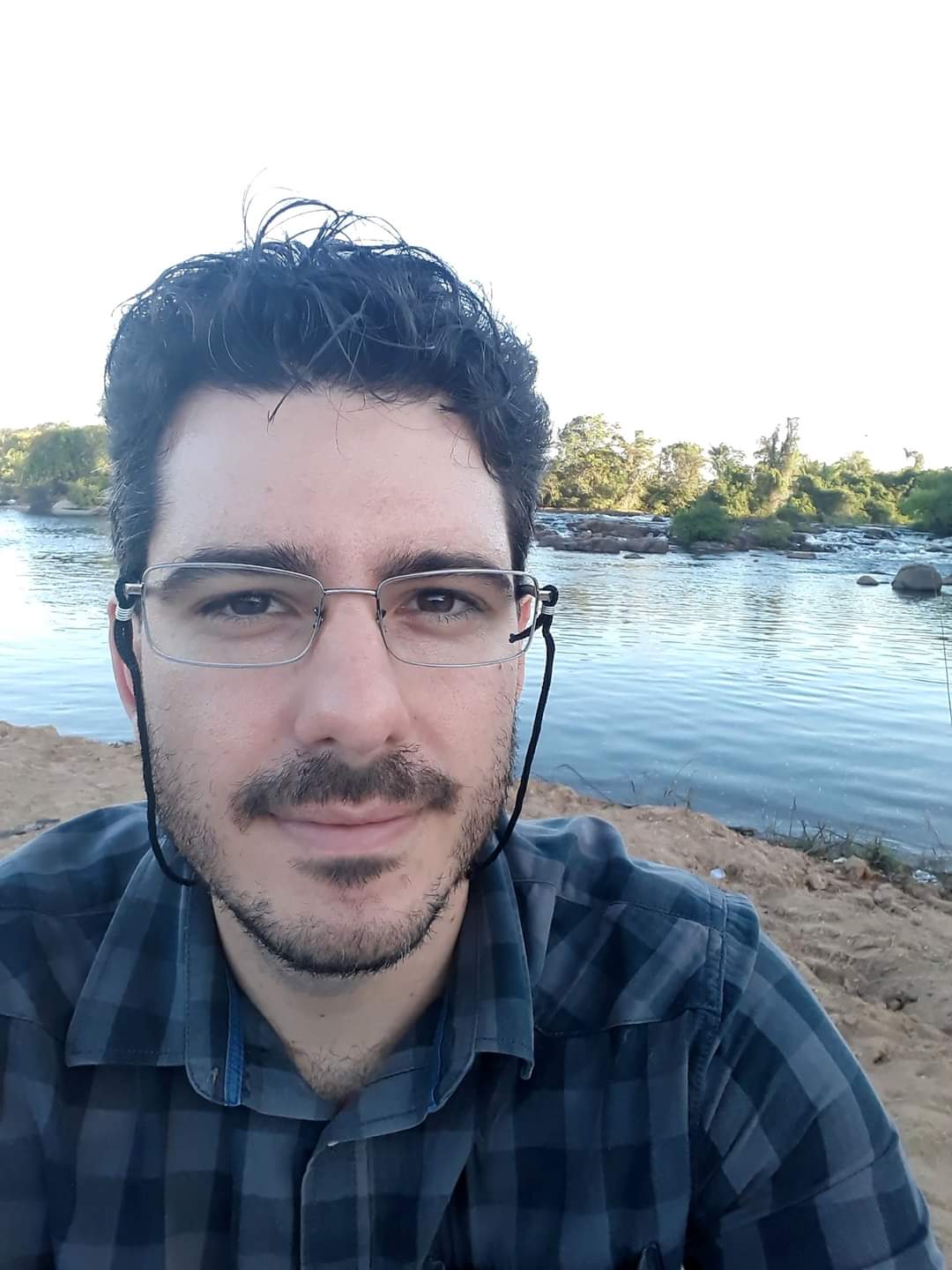About the Jim Smith Fund
Who Was Jim Smith?
Jim Smith was the Membership Chair for the Ohio Cichlid Association from 1991 to 2003.
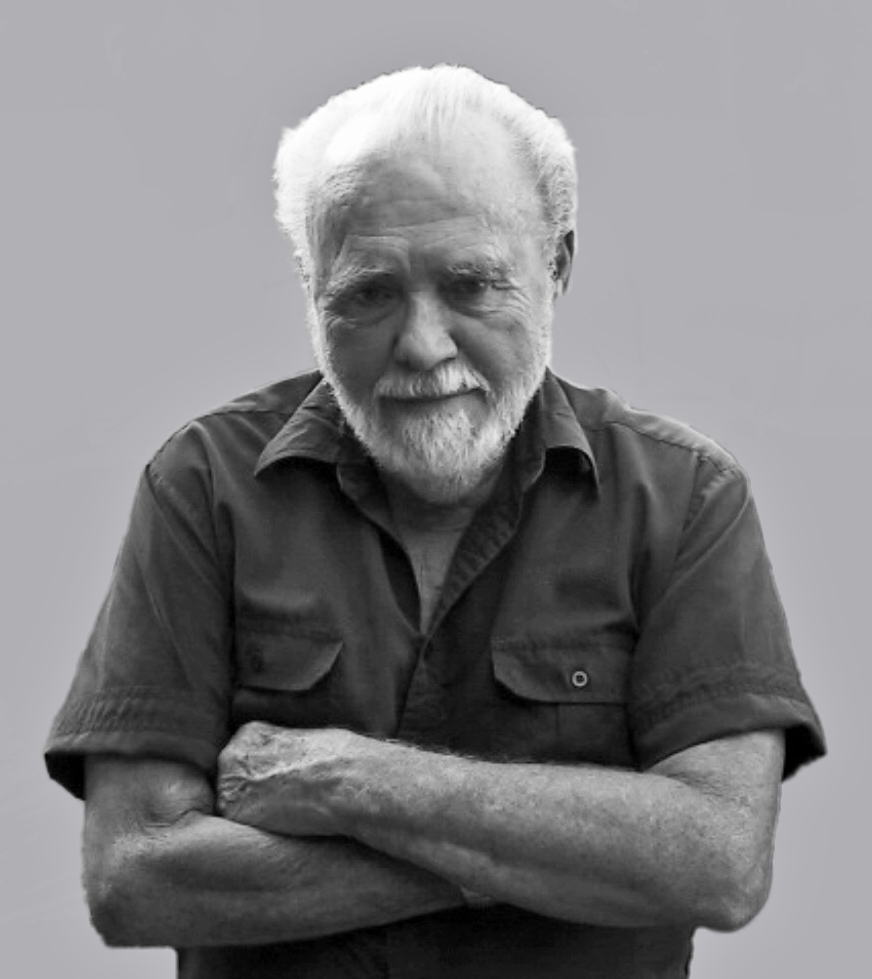
Jim was not a big man, but because of his obvious physical and mental toughness, fronted by a calm, friendly demeanor, he was loved and respected by friends and co-workers, who referred to him as “The Buffalo”. We in the OCA often called him “Santa”, both because of his looks and because of his gentle and patient way with young children.
What is the Jim Smith Fund?
Following Jim’s passing, in July of 2003, the OCA board knew that something big had to be done to honor Jim’s memory. The lead was taken by OCA board member Dan Woodland. Later that year, the OCA announced the establishment of the Jim Smith Fund. The purpose of the fund is to support research, education and conservation efforts that focus on cichlids and catfish.
How can I support the Jim Smith Fund?
The OCA has fund-raising activities, such as auctions and raffles at meetings and events, to benefit the Jim Smith Fund. When you support these efforts, you help to fund cichlid and catfish research, education, and conservation projects, and carry on the good work that Jim Smith started many years ago. You can donate fish or aquarium goods at any event, or make a cash donation directly to the OCA. Any OCA Board Member can take your donation in person, or you can donate directly at Support Jim Smith Fund Here.
How can I apply for a Jim Smith Fund grant?
If you have a project in mind that that shares all or some of the goals of the Jim Smith Fund, email JSF Chair Lew Carbone at lewcarbone@gmail.com . You will be added to the list of invitees that will be notified when the next application period begins.
Because of your support, the Jim Smith Fund has been able to make these donations:
At the 2024 Extravaganza, the OCA announced that a Jim Smith Fund grant will be awarded to Dr. Oliver Lucanus and Dr. Margaret Kalacska of McGill University, in Montreal. They are studying the potential ecological degradation of the Pantanal, a large area of South American wetlands, specifically around the Serra do Bodoquena National Park, in Brazil. The area has a thriving and well-managed ecotourism industry that is valuable to the local economy while protecting the ecosystem. Their goal is to identify threats to the survival of the natural habitat, with its endemic fish species, and to the tourism industry. They will be using historical satellite images and ground truth photographs taken by Drs. Lucanus and Kalacska. The OCA is awarding $2500 to help with the costs of the field work portion of the project. Dr. Adrian Indermauer, a colleague of Dr Lucanus, accepted the award on their behalf.
A second grant was announced at the 2024 Extravaganza, this one going to Dr.Ernesto Arbeláez Ortiz, the Executive and Conservation Director at the Bioparque Amaru of Cuenca, a zoo and conservation organization in Ecuador. The Zoo Amaru is in the process of acquiring over 1800 acres of protected and pristine Amazonian rainforest, which is designated as a private reserve. They are planning three expeditions in the reserve to survey the fish species found there. They’re also planning a “Fish School” event with the local Shuar people. For this event, they’ll trade fish stories with Shuar fisherman and set up several tanks to display and photograph freshly collected local fish. The Jim Smith Fund is contributing the final $1200 needed to cover the cost of field supplies and the Fish School. The award was accepted by one of Dr. Arbeláez’s partners for the project, the Akron Zoo’s Director of Conservation, Dr. Carlos Martinez Rivera.
Dr. Michael Olaoluwa Popoola, from Obafemi Awolowo University in Ile-Ife, Nigeria has 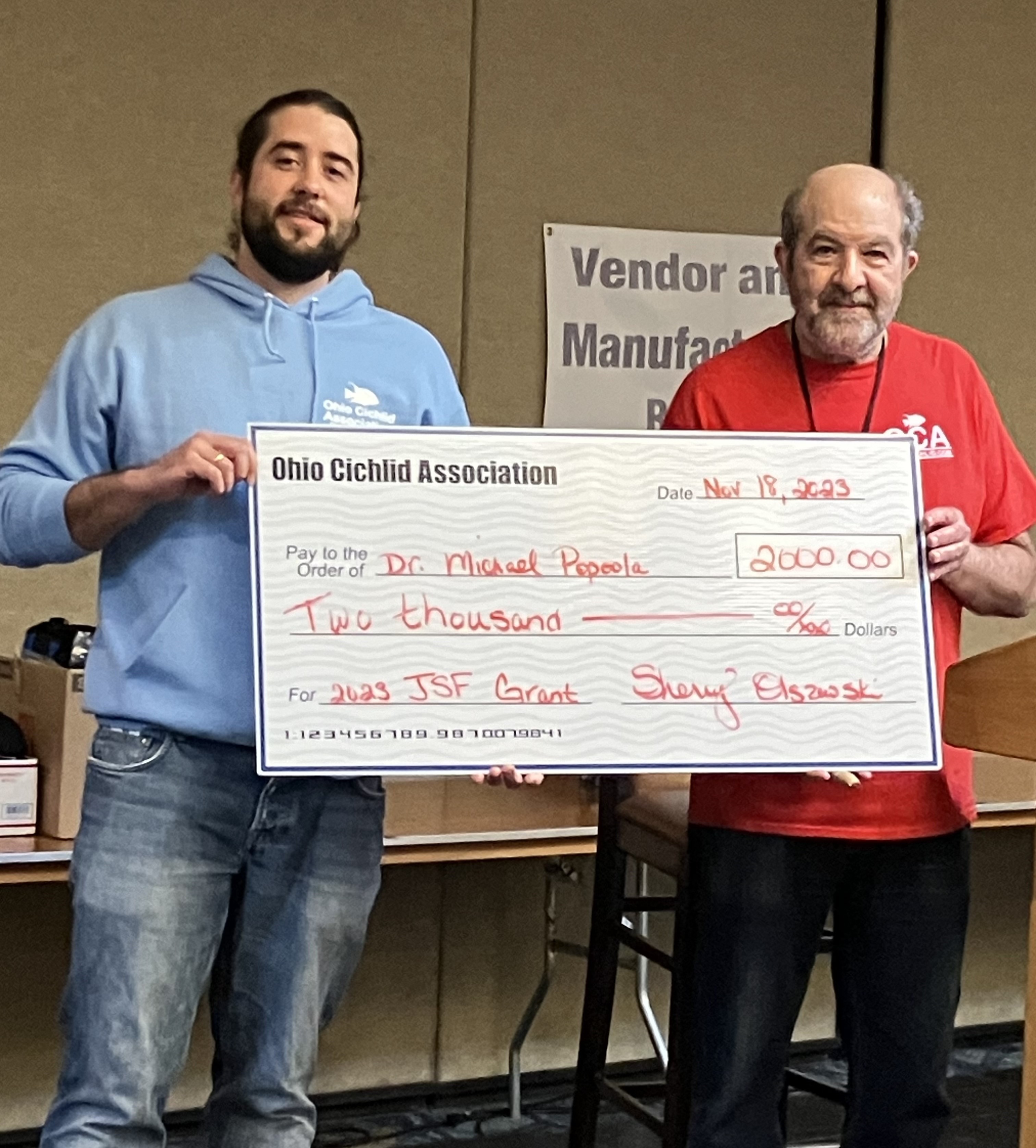 been studying an area of Cameroon, including the Cross River drainage, that has had virtually no attention from the scientific community. In early 2022, he collected specimens of 33 species of fish, 6 of which are cichlids. 4 of the cichlids were completely new to science, and 2 were previously collected but remain undescribed. This project is about doing both DNA analysis and traditional morphological studies on these 6 species. Dr. Popoola must travel with the specimens to The Bavarian State Collection of Zoology in Munich because the kind of facilities that are needed are unavailable in Nigeria. To fund the travel expenses, the OCA has provided $2,000.00. Fredi Schedel, one of the researchers who will be working with Dr Popoola in Munich, accepted the award on Dr. Popoola’s behalf and said a few words about Dr. Popoola and his project.
been studying an area of Cameroon, including the Cross River drainage, that has had virtually no attention from the scientific community. In early 2022, he collected specimens of 33 species of fish, 6 of which are cichlids. 4 of the cichlids were completely new to science, and 2 were previously collected but remain undescribed. This project is about doing both DNA analysis and traditional morphological studies on these 6 species. Dr. Popoola must travel with the specimens to The Bavarian State Collection of Zoology in Munich because the kind of facilities that are needed are unavailable in Nigeria. To fund the travel expenses, the OCA has provided $2,000.00. Fredi Schedel, one of the researchers who will be working with Dr Popoola in Munich, accepted the award on Dr. Popoola’s behalf and said a few words about Dr. Popoola and his project.
In 2023, Dr. Diego J. Elías, a Postdoctoral Researcher at the Field Museum of Natural History in Chicago, won a grant for $1,200. For this project, he proposes “…to collect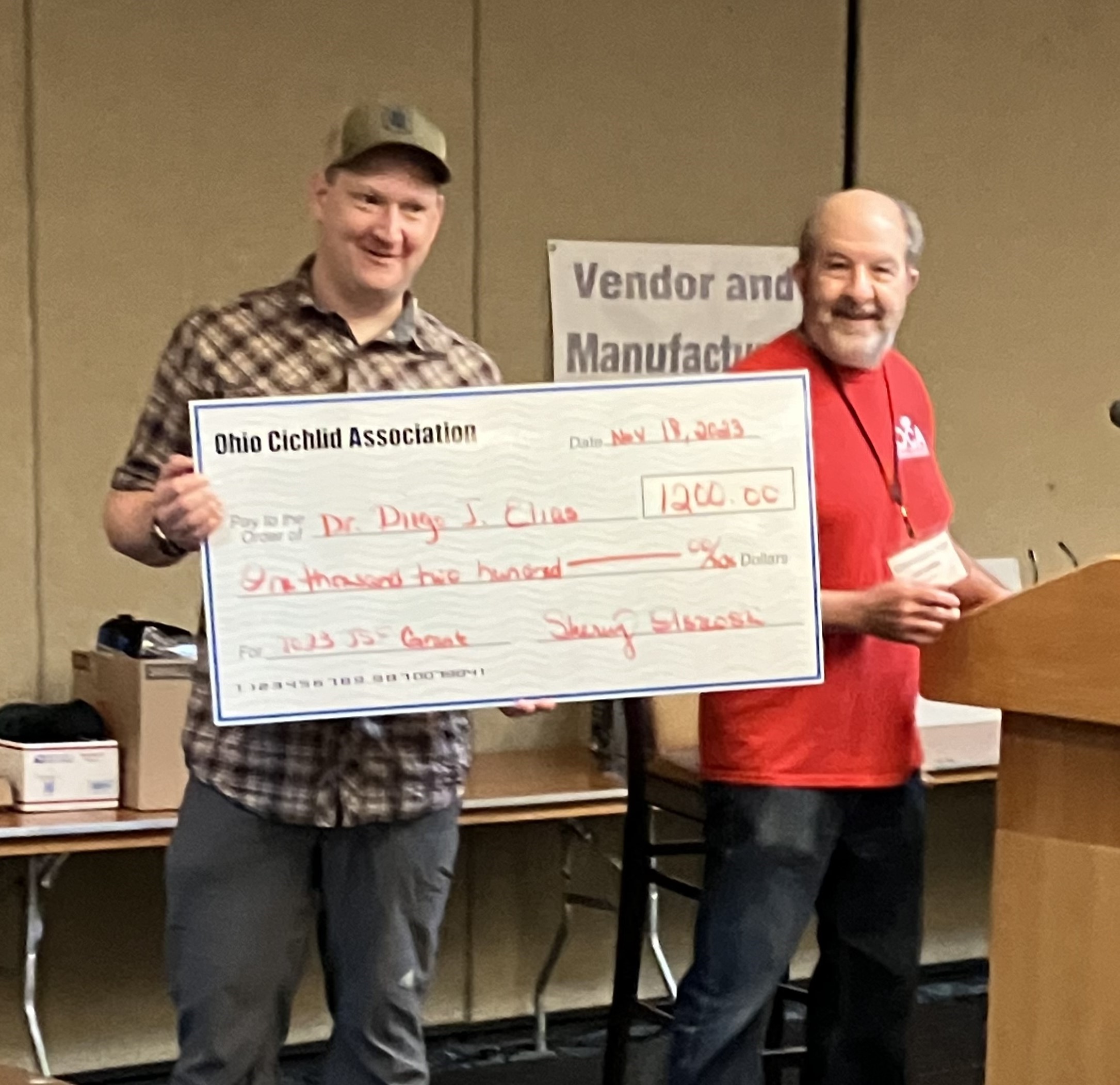 information on hundreds of genetic markers captured across the genomes of all nine currently recognized species of Thorichthys collected from across their known distributions.” He also plans on analyzing the results of the DNA tests using various methods to see if the different methods yield different results. At the Awards Presentation, his colleague, Michi Tobler, accepted the award on Dr. Elias’s behalf.
information on hundreds of genetic markers captured across the genomes of all nine currently recognized species of Thorichthys collected from across their known distributions.” He also plans on analyzing the results of the DNA tests using various methods to see if the different methods yield different results. At the Awards Presentation, his colleague, Michi Tobler, accepted the award on Dr. Elias’s behalf.
Xiaomeng Tian, a Ph.D. candidate at the University of Konstanz, in Germany, and the 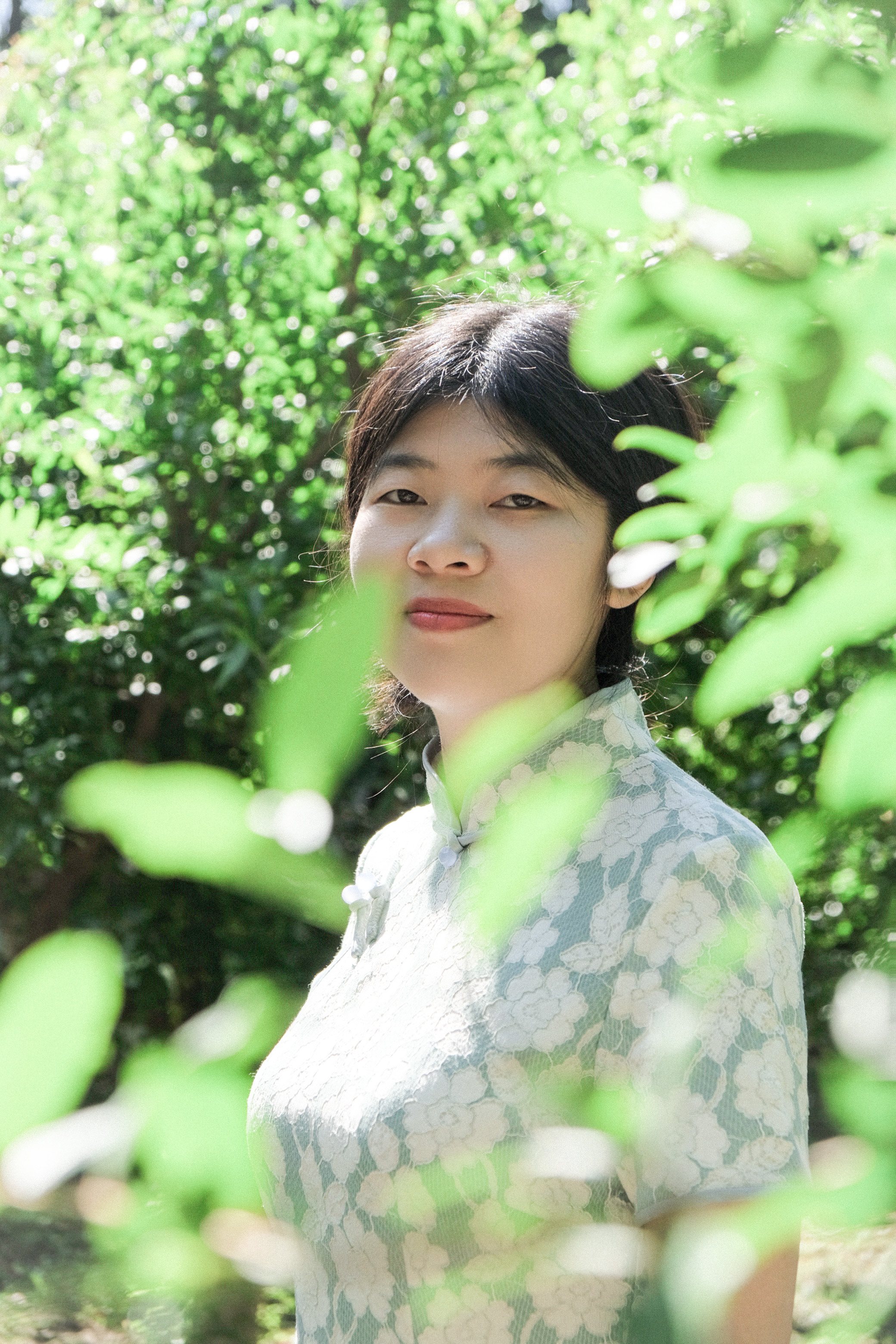 student of 2017 grant winner Ryan Greenway, won a JSF grant at the 2022 Extravaganza. Her project involves the Tanganyikan scale-eating cichlid Perissodus microlepis, which have a mouth either turned to the left to attack the right side of victims, or to the right to attack the left side. Determining how and why the ratios between the 2 morphs change over time is the objective of her study. The JSF is contributing $1400 for supplies for her experiments.
student of 2017 grant winner Ryan Greenway, won a JSF grant at the 2022 Extravaganza. Her project involves the Tanganyikan scale-eating cichlid Perissodus microlepis, which have a mouth either turned to the left to attack the right side of victims, or to the right to attack the left side. Determining how and why the ratios between the 2 morphs change over time is the objective of her study. The JSF is contributing $1400 for supplies for her experiments.
Another grant in 2022 went Dr. Ron Coleman, of California State University, Sacramento. 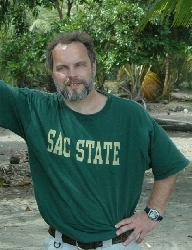 Ron, who has spoken at past Extravaganzas and OCA monthly meetings and has won 2 previous JSF grants, is planning an expedition to Costa Rica to study why two groups of cichlid species seem to stay separate, even though there is no major geographical barrier between them. The $2000 grant is mainly for travel expenses related to the expedition.
Ron, who has spoken at past Extravaganzas and OCA monthly meetings and has won 2 previous JSF grants, is planning an expedition to Costa Rica to study why two groups of cichlid species seem to stay separate, even though there is no major geographical barrier between them. The $2000 grant is mainly for travel expenses related to the expedition.
The 2021 JSF grant went to Dr. Anthony Mazeroll of Soka University, in California, who founded and operates the Amazon Research Center for Ornamental Fishes. https://www.amazonresearchcenter.org/ Located near Iquitos, Peru, in the Peruvian Amazon, The Research Center includes the Museum of the Amazon and a Junior Conservationist program for children. One of the main goals is to educate the local people about how precious and fragile their surrounding ecology is, and how they can benefit from breeding and selling local species in a sustainable manner. The $2500 grant will be used for educational supplies for the Junior Conservationists. Dr. Mazeroll was present at the Extravaganza Reboot 2021 to receive his grant.
During the 2020 Virtual Extravaganza, Luiz Tencatt PhD, researcher at the Federal University of Mato Grosso do Sul, Brazil, received $1500 for his project “The fishes from the Rio Correntes: a search for the hidden beauties of Central Brazil”. The Rio Correntes, in Brazil, is part of the Rio Paraguay drainage. At one point, it flows underground for about 3000 ft, which completely splits the river’s fish species. Down river you’d find the normal species assemblage for that drainage, but upriver is a whole different assemblage, which has been rarely sampled. Luiz will use this grant to purchase equipment and fuel to do more thorough collecting in that area. Luiz reported to the OCA journey during the 2021 Extravaganza. Here is his presentation: https://youtu.be/TBp9dDUgmdQ
Also in 2020, Project Piaba won a $300 grant based on a proposal by Nick Zarlinga, the  Head Aquarist at the Cleveland Metroparks Zoo. Project Piaba is a program that focuses on keeping a region of Brazil in its more-or-less natural state by making it possible for the people to earn money by collecting fish for the aquarium trade, in a sustainable manner. The thinking is that if locals can make a good living this way, they will work to protect the river and surrounding countryside from mining and logging companies.
Head Aquarist at the Cleveland Metroparks Zoo. Project Piaba is a program that focuses on keeping a region of Brazil in its more-or-less natural state by making it possible for the people to earn money by collecting fish for the aquarium trade, in a sustainable manner. The thinking is that if locals can make a good living this way, they will work to protect the river and surrounding countryside from mining and logging companies.
Joe Cutler, Ph.D. candidate the University of California, Vera Cruz, and a National Geographic Explorer, won the 2019 Jim Smith Award grant for $2000 toward his project “The Ogooué Megatransect”. This will be a major expedition along most of the Ogooué River, in Gabon, to survey the river and collect fish samples. The goal is to convince the Gabonese government to either abandon a proposed dam project or take steps to minimize the damage to local ecosystems. At the very least, it will document the river’s habitats as they are now. Accepting the award for Joe is the 2018 JSF grant winner, Oliver Lucanus. Joe reported to the OCA about his journey during the June 2020 online meeting. You can see his presentation here: https://www.youtube.com/watch?v=JkqwhKre66Q&t=2356s Joe's part begins at about the 35:00 mark.
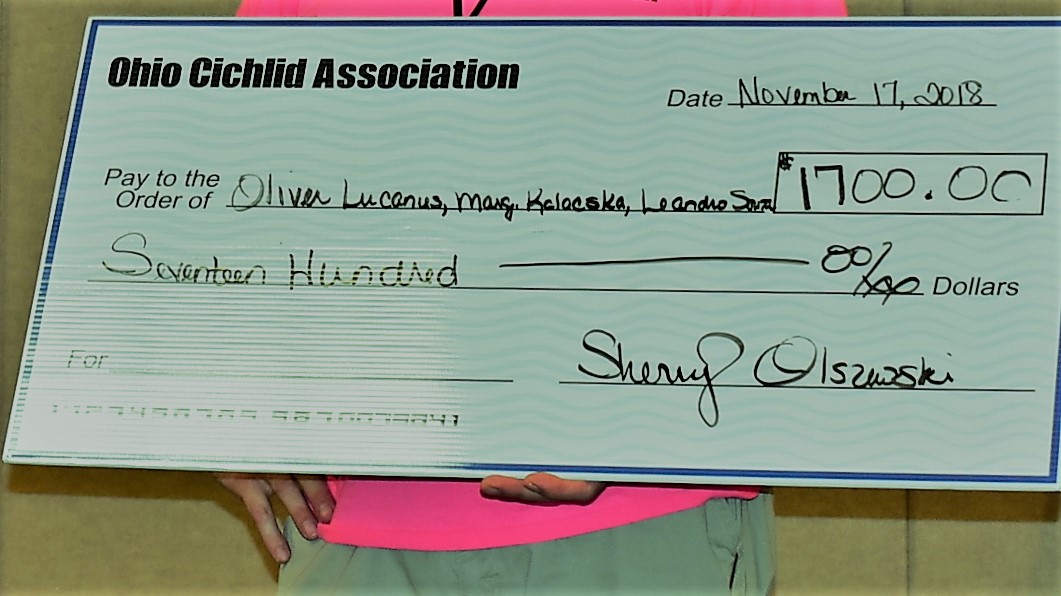 Our 2018 Jim Smith Fund grant, of $1700, went to a team of researchers from McGill University, in Canada, and University of Pará, in Brazil. The team is made up of Oliver Lucanus (McGill), Dr. Margaret Kalacska (McGill) and Dr. Leandro Sousa (Pará). They will use photogrammetry (3-D digital mapping that uses hundreds of photos) to study the bottom of a gravely threatened part of the Rio Xingu. The data and 3D printing will be used to make artificial stand-ins for the Xingu’s substrate. These structures will be installed in aquariums, ponds or man-made streams in order to get the more difficult-to-breed species from this area to reproduce, thereby keeping them alive in captivity, even if they go extinct in the wild.
Our 2018 Jim Smith Fund grant, of $1700, went to a team of researchers from McGill University, in Canada, and University of Pará, in Brazil. The team is made up of Oliver Lucanus (McGill), Dr. Margaret Kalacska (McGill) and Dr. Leandro Sousa (Pará). They will use photogrammetry (3-D digital mapping that uses hundreds of photos) to study the bottom of a gravely threatened part of the Rio Xingu. The data and 3D printing will be used to make artificial stand-ins for the Xingu’s substrate. These structures will be installed in aquariums, ponds or man-made streams in order to get the more difficult-to-breed species from this area to reproduce, thereby keeping them alive in captivity, even if they go extinct in the wild.
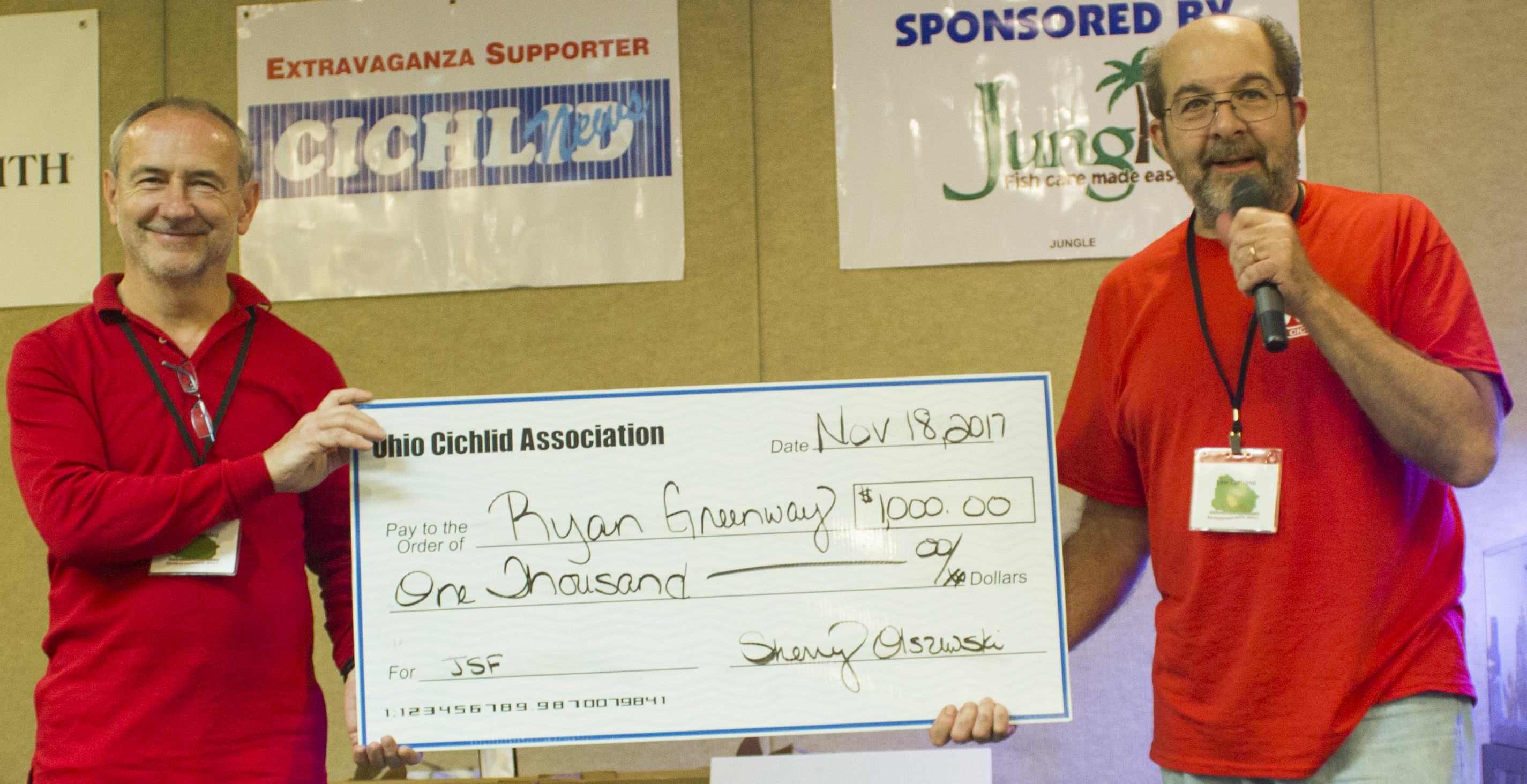
Ryan Greenway, a PhD candidate at Kansas State University, was awarded a $1,000 Jim Smith Fund grant at the 2017 Extravaganza. Ryan is studying the interrelatedness of, and possible hybridization between, 3 species of Thorichthys, living in 4 different areas of the Grijalva River Basin, in Mexico. He will be using the funds to pay for genetic testing. Anton Lamboj, a colleague of Ryan’s PhD advisor, Dr. Michael Tobler, accepts the award on his behalf.
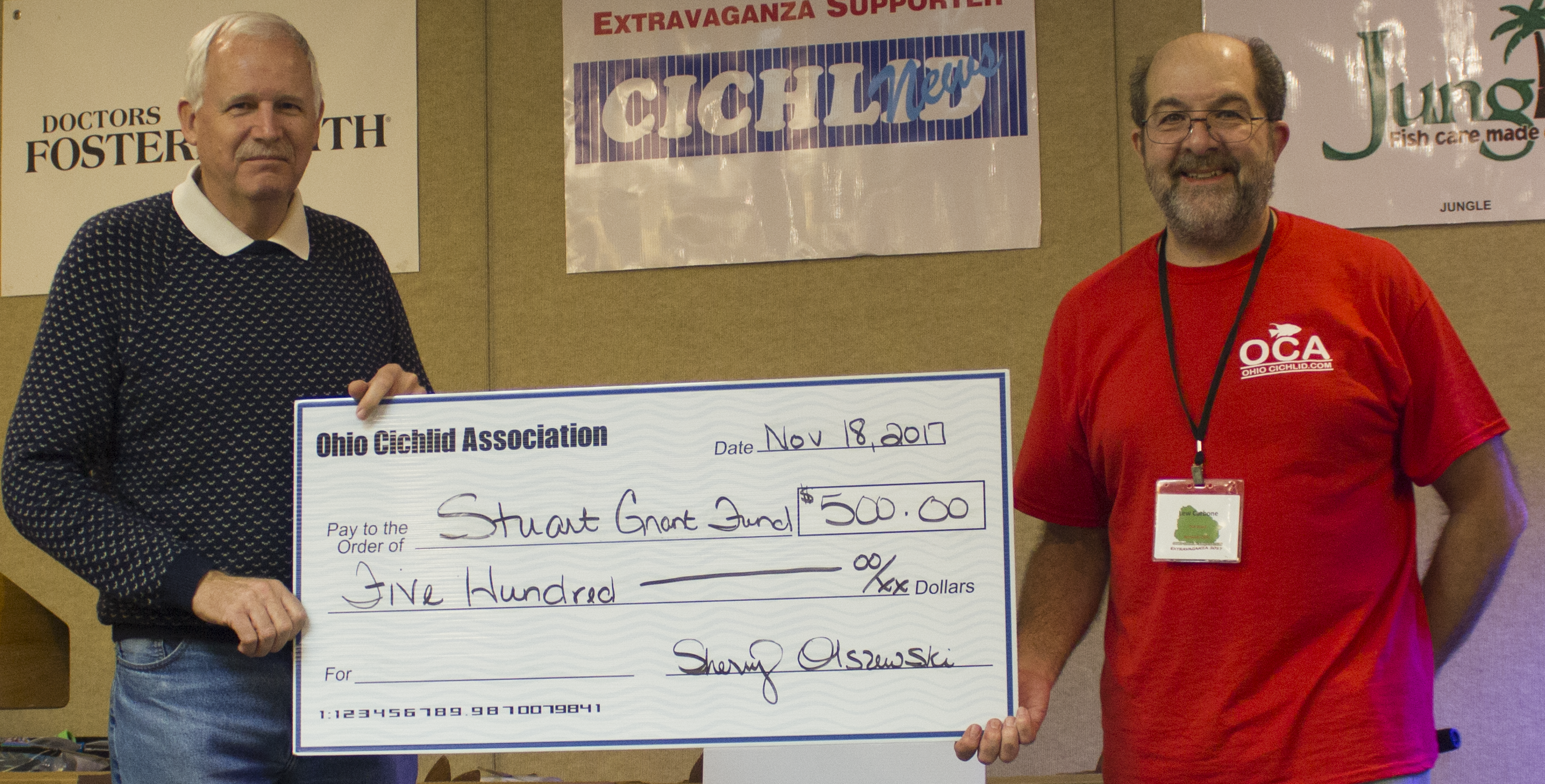
Ad Konings recently discovered that the Tropheus duboisi “Maswa” is virtually extinct in Lake Tanganyika, due to over-collecting. In 2017, the Jim Smith Fund gave a $500 grant to the Stuart Grant Fund, earmarked for obtaining a large group of already captive “Maswa” adults. The intent is to begin a breeding program with the goal of eventually re-establishing a wild population in their original home range. Ad accepts the award, and will oversee the project.
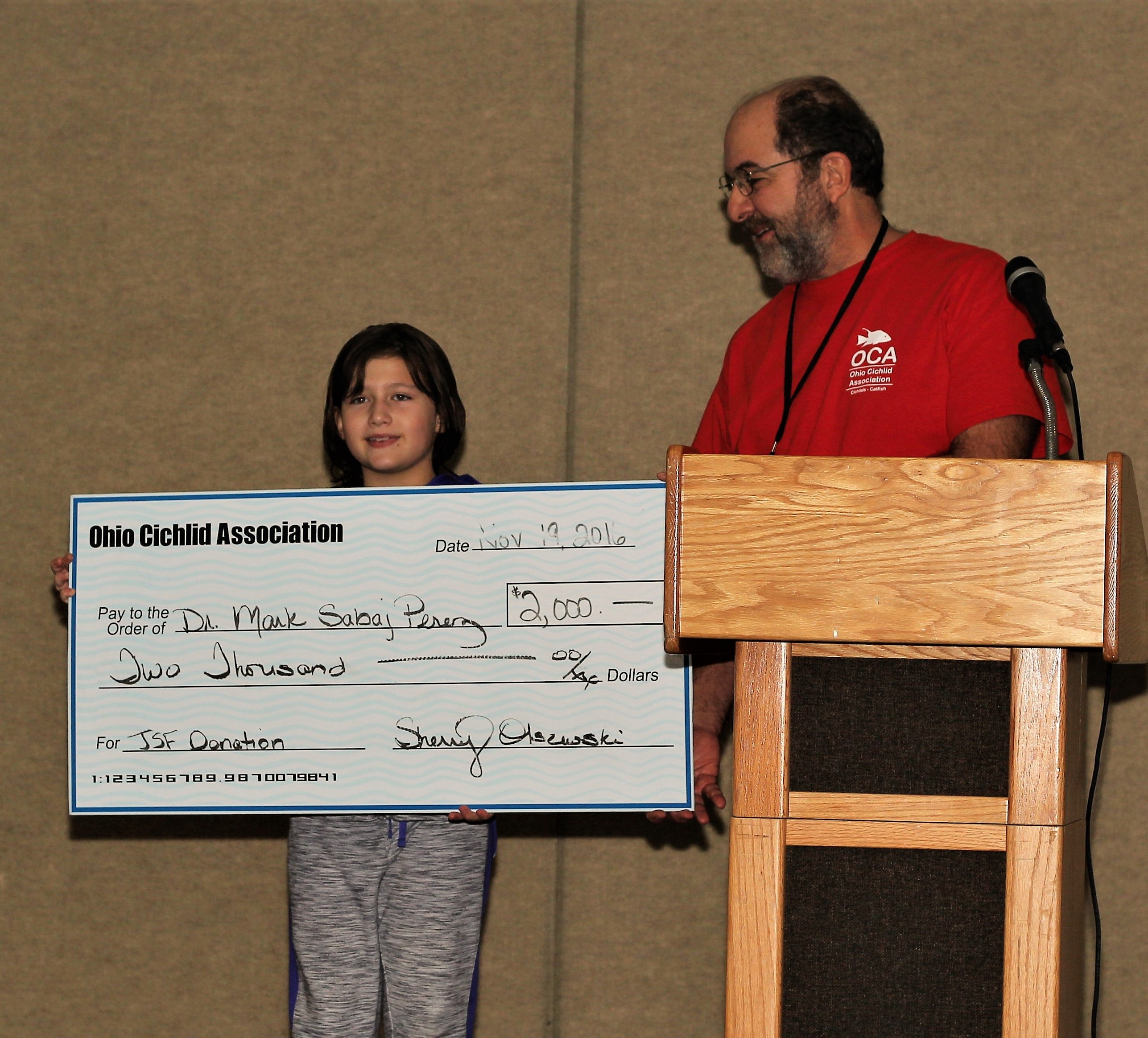
At the 2016 Extravaganza, Dr. Mark Sabaj Perez was awarded $2000 for a project involving the identification, labeling and imaging of a collection of specimens owned by the 19th Century ichthyologist Edward Drinker Cope. Most of the work will be done by advanced students at the Ichthyology Department of The Academy of Natural Sciences of Drexel University, in Philadelpia, under the direction of Dr. Sabaj. The newly organized collection, along with the digital images, will be available for examination by all qualified researchers. Arwen DeWerth, daughter of OCA board member Marc DeWerth, accepts the award for Dr. Perez.
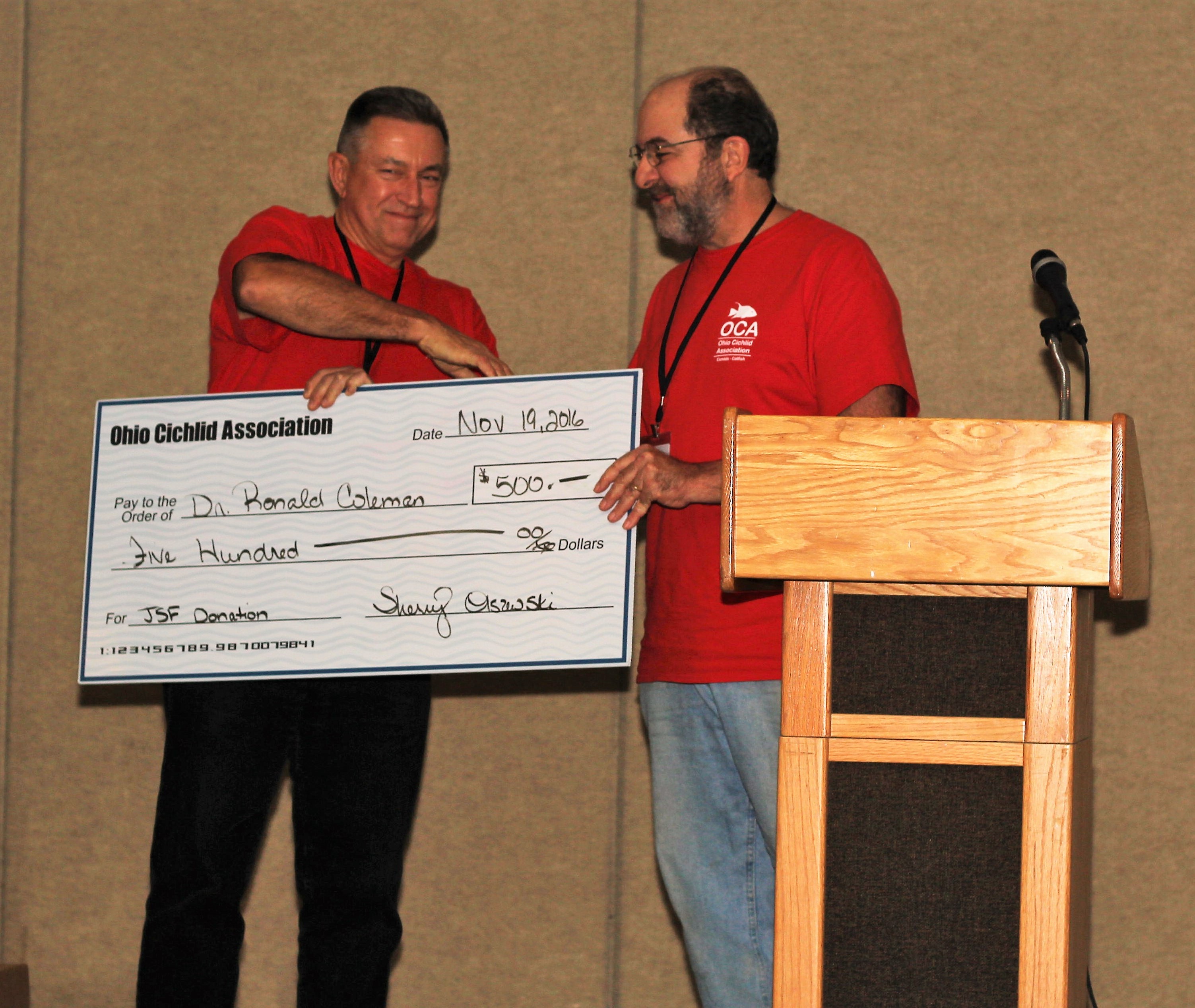
In 2016, Dr. Ron Coleman, a Professor at the Department of Biological Sciences of California State University, Sacramento, received $500 for his continuing study of Hypsophrys nicaraguense, in Costa Rica. Dr. Coleman is represented by his friend Don Danko, an OCA charter member and board member.
Melanie Stiassny, of the American Museum of Natural History, in New York, received a $1200 grant from the Jim Smith Fund, at the 2015 Extravaganza. On her next expedition to the Congo River, she will use the money to fund attempts to collect live Teleogramma obamaorum, a species she recently described from a single preserved specimen. Accepting the award for Dr. Stiassny is her colleague, Ad Konings.
Sam Borstein, of The University of Tennessee, received a $2000 grant from the Jim Smith Fund at the 2015 Extravaganza. Sam is studying mbuna to find out how different species utilize the same areas of the algae cover in different ways. He will use the money to buy components for equipment that will use high-speed videography to record feeding mechanics while simultaneously measuring bite pressure. Phil Clary, a long-time friend of the Borstein family, accepts the award for Sam.
During the 20th Extravaganza in 2014, the Jim Smith Fund was able to award $1,000 to Ad Konings, to help build a captive breeding facility on LakeTanganika.

In 2013, because of your generous donations, the
 Jim Smith Fund was able to award two amounts. Ed Burress received $1,500 to study cichlid diversification, and Ron Coleman was granted $1,000 for field work in Costa Rica. Thanks for the donations and keep up the great work. Cichlid fishes as models of ecological diversification »
Jim Smith Fund was able to award two amounts. Ed Burress received $1,500 to study cichlid diversification, and Ron Coleman was granted $1,000 for field work in Costa Rica. Thanks for the donations and keep up the great work. Cichlid fishes as models of ecological diversification »
During Extravaganza 2012, The Ohio Cichlid Association donated $1500 to Penn State University Professer Jay Stauffer. Dr. Stauffer is heading a project to videograph an
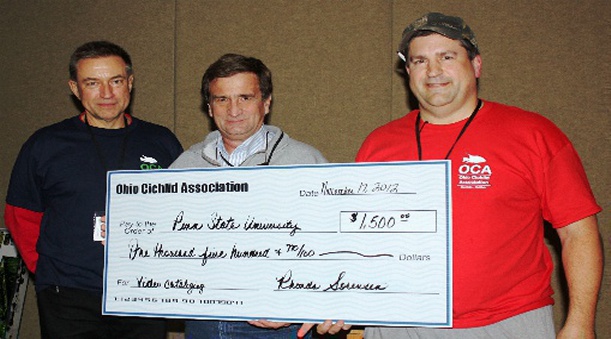 astounding amount of cichlids in the wild in an attempt to document their habitat and behavior. When completed, this video library will be made available to researchers throughout the world. It is hoped that we can further research to increase the amount of knowledge about cichlid species and habitat so that this knowledge will exist well into the future. Shown L to R are: OCA President, Don Danko, Dr. Jay Stauffer, and OCA Vice-President, Dan Woodland.
astounding amount of cichlids in the wild in an attempt to document their habitat and behavior. When completed, this video library will be made available to researchers throughout the world. It is hoped that we can further research to increase the amount of knowledge about cichlid species and habitat so that this knowledge will exist well into the future. Shown L to R are: OCA President, Don Danko, Dr. Jay Stauffer, and OCA Vice-President, Dan Woodland.

At Extravaganza 2012, a second donation of $1000 was made to Ad Konings and Dr. Jay Stauffer to support their Lake Malawi Breeding Project. It is hoped that with support of The Jim Smith Memorial Fund, that some threatened species can be bred in protected areas to compensate for over-fishing and habitat loss. Shown L to R are: OCA President, Don Danko, Dr. Jay Stauffer, Ad Konings, and OCA Vice-President, Dan Woodland. Click here for more details on the Malawi Breeding Project »
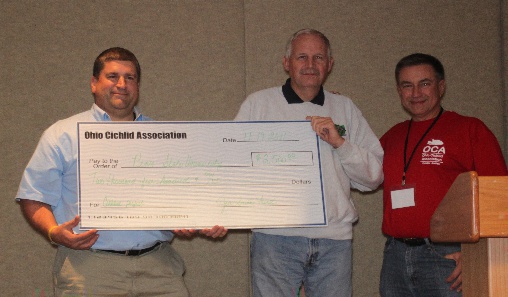
In 2011, the Jim Smith Fund donated $2,500 to Jay Stauffer at Penn State Universtiy. Due to the support from the OCA and it's members Dr. Stauffer and his assistants were able to type and catelog over 3,200 collections of Cichilds amounting to over 52,000 specimens. Those cateloged specimens are now available to Cichlid researchers worldwide!! Shown L to R are: OCA Vice-President, Dan Woodland, Ad Konings, and OCA President, Don Danko. Click here for more details on the Penn State Project »

In 2010, the Jim Smith Fund was able to donate $1,000 to the Max Hayes High School Metal Workshop - The support from the Jim Smith Fund helped to make it possible for the program to build items for the Ronald McDonald House.
In 2009, the Jim Smith Fund was able to donate $1,000 to the Stewart M. Grant Conservation Fund under the stewardship of Ad Konings. This was the second donation from the Jim Smith Fund having already contributed $1,000 to the same cause in
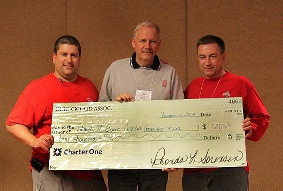 December 2008. The money will support local people in Malawi in their efforts of protecting cichlid populations in Lake Malawi against irresponsible and illegal overfishing through the creation and installation of Anti-Netting Devices (ANDs).
December 2008. The money will support local people in Malawi in their efforts of protecting cichlid populations in Lake Malawi against irresponsible and illegal overfishing through the creation and installation of Anti-Netting Devices (ANDs).


